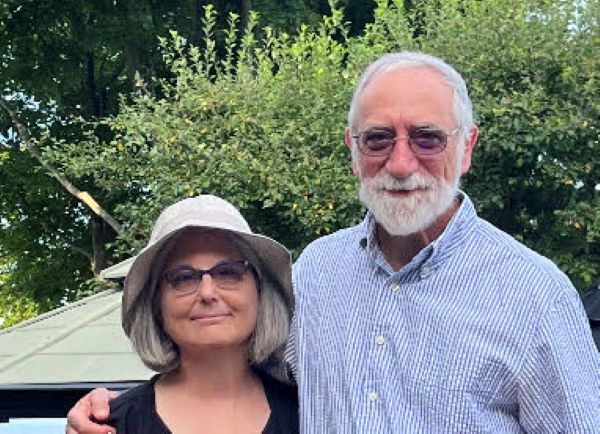
With a generous gift to Penn Engineering, longtime Penn professors Daniel E. Koditschek and his wife, Anne M. Teitelman, chose to turn a dark time in history, both for the world and for their own family, into a bright spot for burgeoning academics.
Koditschek is the Alfred Fitler Moore Professor of Electrical and Systems Engineering in Penn Engineering, and Teitelman is an Associate Professor Emerita in Penn Nursing. In 2019, the couple endowed a doctoral fellowship in Electrical and Systems Engineering to honor Koditschek’s paternal grandmother, Elsa Koditschek, and her son and daughter-in-law — Koditschek’s father and mother — Paul and Leah Koditschek.
“The whole family has a passionate attachment to the creation of human knowledge and the purveyors of human knowledge,” says Koditschek. “In providing the fellowship, we get to shine that light a little bit.”
In November, family members and Penn Engineering representatives gathered on campus to commemorate the fellowship’s importance and impact for future students in need.
At the celebration, Penn Engineering’s Nemirovsky Family Dean Vijay Kumar commended the Koditscheks’ devotion to Penn. He said, “Anne and Dan, it’s personally inspiring to see colleagues like you give back so generously to Penn, to which you have already contributed so much. It reflects your deep commitment to this institution we all love and its mission to harness knowledge for good.”
A story of survival
To appreciate the significance of the Koditschek Fellowship, one must first know something of Elsa Koditschek’s extraordinary story, which was detailed in a 2018 article in The New York Times, “The Nazi Downstairs: A Jewish Womanʼs Tale of Hiding in Her Home.”
In 1940, Nazis moved a German SS officer into Elsa’s house in Vienna. She was allowed to stay upstairs in her tenant’s apartment, but after being ordered to deport to a Polish ghetto, she fled into hiding, leaving behind many family heirlooms, including the landscape painting, “City in Twilight,” by Egon Schiele, an Austrian Expressionist.
Narrowly escaping capture during a 1943 Nazi raid of her initial safe house, she snuck back into the former tenant’s apartment in her stolen house and survived there secretly in a closet. Upon the war’s end, she wrote about her experiences in detailed letters to her son. These accounts helped build the provenance of the painting, which had been sold during the war and several times since.
Sotheby’s auctioned off the Schiele in November 2018, with the proceeds shared between the painting’s owners at the time and the Koditschek family. It was with these funds that Koditschek, Teitelman and their family established the fellowship.
Cultural stewards
Koditschek admits to having mixed feelings about selling the Schiele. But his perspective on owning such a “piece of high human culture,” he says, is clear. “Really, you can’t own a masterwork of art,” he says. “You’re a steward for that cultural achievement.”
He adds that he and his family aren’t suited to properly steward the painting, “but we do understand the construction of human knowledge as the fruit of its purveyance — education — and so it seemed that the appropriate means to manifest our stewardship of this piece of culture would be to sow some new seeds,” he says.
As for where he and his family would entrust the proceeds, Koditschek says there was no question they would invest in furthering educational opportunities, and even less question as to where. “I love the University of Pennsylvania,” he says. “It’s treated me extraordinarily well. I’ve flourished here.”
The fellowship
The fellowship, which covers doctoral tuition and a stipend, is to be awarded by the Chair of the Department of Electrical and Systems Engineering (ESE) to a doctoral candidate who “demonstrates promise for advancing engineering science at the intersection of mathematics and biology applied to the analysis and design of intelligent systems.”
Preference is given to first-generation, low-income, or displaced students, which “honors the experience of Elsa Koditschek, my grandmother, my family, and many, many families in Europe who endured the Holocaust,” says Koditschek. “They were displaced, they were turned into refugees, and of course many of them lost their lives.”
Koditschek stresses that the Department will assign funds with no further influence from the family as befits their staunch belief in the independence of scholarly inquiry.
Troy Olsson, Associate Professor and Graduate Chair of ESE, helps to administer the Department’s doctoral fellowships and notes that the Koditschek Fellowship provides recipients with greater academic freedom than some funding sources. “Often, doctoral candidates receive grants that require students to focus on particular research areas. The Koditschek Fellowship,” he says, “gives them a little bit of extra flexibility.”
As for the Koditschek family, the establishment of the fellowship is a way to take something horrible and turn it into a celebration. “In my book,” says Koditschek, “universities are temples of human civilization, the very origin of culture. And so it makes complete sense to invest one’s stewardly responsibilities in a great university.”
This story was written by Abbey Porter.
